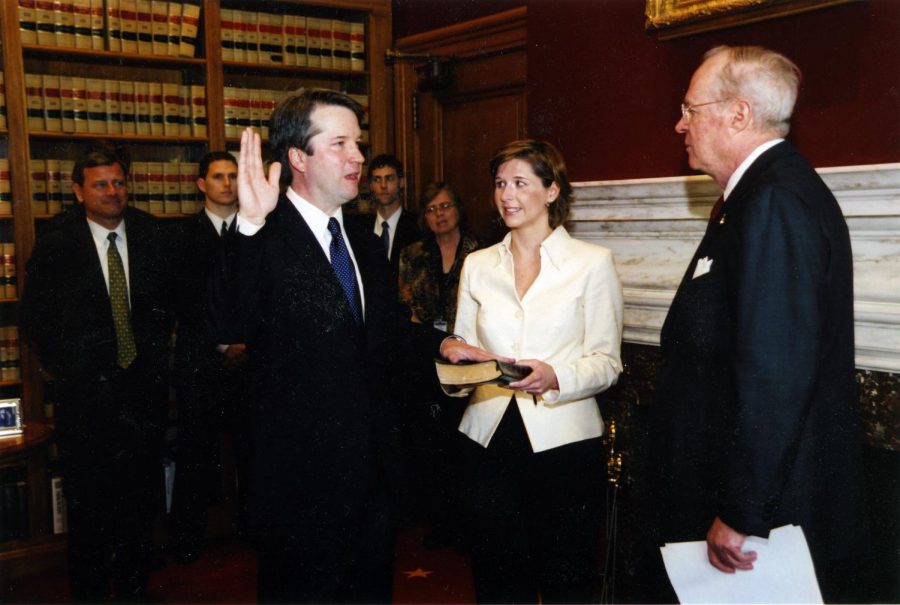Opinion: Supreme Court nominee confirmed amidst scandal
Sexual assault in the media and the ongoing struggles of survivors
October 10, 2018
The confirmation process of new Supreme Court Associate Judge Brett Kavanaugh was not easy. It was not quick. And for many, it brought decades-old memories to the surface.
After weeks of continued controversy, Kavanaugh has been confirmed to serve as an Associate Judge on the Supreme Court following a close 50-48 vote in the Senate. However, the new Republican majority his confirmation created in the court does not represent the views of the American people. The 50 (mostly conservative) senators who voted yes on Kavanaugh represent only 143 million, or 43 percent, of the American people, while the 48 senators who voted no represent 181 million people. This is a disturbing setback in democracy and the rights of the people.
The controversy began the moment President Trump nominated Kavanaugh to serve as an Associate Judge, replacing newly retired Justice Anthony M. Kennedy. Hundreds of people came to his confirmation hearing to protest Kavanaugh’s views on abortion; he has continually reinforced the belief that the government should be able to strictly regulate abortion, harming the rights of women to have control over their bodies and their privacy. A group of women even came dressed in costumes from the dystopian TV show “A Handmaid’s Tale,” set in the not-so-distant future where women have no rights, a bold move emphasizing just how chilling Kavanaugh’s views really are.
On Sept. 16, Dr. Christine Blasey-Ford, a psychology professor at Palo Alto University, came forward with allegations that when she was 15 years old, Kavanaugh, then 17, sexually assaulted her one night at a small gathering. She stated that he led her to a room in the house while extremely intoxicated. He then pinned her down on the bed and groped her. When she tried to scream, he put her hand over her mouth. In that moment, she believed that he would inadvertently kill her.
“I tried to yell for help,” Ford said in her chilling opening statement. “When I did, Brett put his hand over my mouth to stop me from screaming. This was what terrified me the most, and has had the most lasting impact on my life. It was hard for me to breathe, and I thought that Brett was accidentally going to kill me.”
Her allegations didn’t lack evidence; she described the assault in multiple therapy sessions years ago and even alluded to Kavanaugh being her attacker. She passed a polygraph test that showed all parts of her story to be true. Many alumni of her high school, Holton-Arms School, shared their support of her. Despite this, her courage and self-sacrifice for the American people don’t seem to hold much weight in the eyes of lawmakers.
This story is all too familiar for thousands of women. Statistics from the National Sexual Violence Resource Center show that nearly 1 in 5 women are sexually assaulted, abused or raped in their lifetime. Rape and sexual assault are the most underreported crimes; only 310 out of every 1000 cases are reported to the police. In the cases that are reported, many women report that no action is taken, and they are left to deal with the emotional and physical trauma for the rest of their lives.
Soon after Ford’s allegations toward Kavanaugh were made public, two other women came forward: Debbie Ramirez and Julie Swetnick. Ramirez claims that Kavanaugh exposed himself to her during their time at Yale University and Swetnick, another girl who knew him in high school, accused him of preying on girls at parties, sometimes even spiking or drugging their drinks.
Kavanaugh has unequivocally denied each of these accusations, and Ford, in particular, was criticized by Republicans for waiting to reveal this information, suggesting that this was a way to delay his confirmation hearings. President Trump believes that Ford made these allegations only to undermine his presidency and to destroy Kavanaugh’s credibility.
Kavanaugh defended himself during the Sept. 24 hearing using proof from the detailed calendars he kept during the summer of 1982, the time frame of the alleged assault. These calendars showed no evidence of him being at a gathering that meets the circumstances described by Ford, and he furthered the notion of the Democrats using Ford as a way to keep him off of the Supreme Court. He also initiated the now popular Republican theory that Ford mixed up her attackers, erroneously accusing Kavanagh.
The notion that Ford completely made up the accusations or even forgot her attacker is a gross underestimation of the lasting impact that sexual assault has on the victim’s life. Ford was greatly criticized for forgetting details of her assault, however, this is a common occurrence. Victims seldom remember every detail of their attack and tend only to remember any unusual aspects of the setting. The mimicking and ridicule aimed at Ford after her testimony was despicable. President Trump’s public statement mocking Ford about being unable to remember specifics was especially childish and absurd, and showed a lack of respect for those who have gone through sexual assault. Ford had continually repeated throughout the hearing how she wished she could remember more and be more helpful.
Despite a heavy push from those who support Ford, Kavanaugh was confirmed as the newest Associate Judge of the United States Supreme Court. Tensions are still high along party lines, and the Kavanaugh situation has opened doors for more scandals to face the government, especially in the upcoming midterm elections. Ford showed immense bravery in coming forth however, people’s truth and their experiences won’t start to make a difference until those in power – despite their political affiliation – recognize them as a serious reason not to put someone like Brett Kavanaugh in a place of high power. But until that day, we must continue to fight those who deny the atrocities women experience in this country and cling to the hope that change will come.


